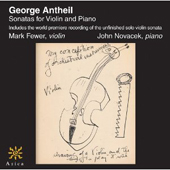
ESSENTIAL RECORDINGS

There must have been something in the water supply of Paris during the first quarter of the 20th century to impel artists of all stripes, including composers, to converge
on the city and all seemingly conspire to create works that were not only innovative for their time, but works that were also pushing the envelope and were constantly
teetering on the edge of an abyss into obscurity. Copland, Schoenberg and Stravinsky to name but a few, all spent time in Paris around that period, which proved to be
very fertile and creative for them, and American composer George Antheil (1900-1959) was no exception as he was pulled into that maelstrom of creative activity and
bore the brunt of many of the stronger influential figures of that era. Some of the music within these sonatas bears the stamp of Stravinsky's L'Histoire du Soldat.
Labeling himself as the "Bad Boy of Music" and prone to sensationalism, his music, including the Sonatas for Violin and Piano Nos. 1, 2 and 4,
and the Sonata for Violin Solo here given its world première recording, is at times disjointed, humorous, sombre, inspired, banal, and
witty all rolled into one. Sort of like a punkish Francis Poulenc. And surprisingly, the Sonata No. 4, which he meant to be a replacement of his second sonata, written twenty
years after the others, is a musical drawback to earlier styles and demonstrates a much stronger grasp of form and structure. Oddly enough, in my opinion, the restraint
makes it seem more radical than the others, in that it wasn't written to scandalize, but to express true emotions.
Violinist Mark Fewer, an established member of various chamber music ensembles, relishes this music and instantly makes clear the point that in this case, the
violin is only the medium, only an instrument used to transmit the music from the composer's mind to our own. He doesn't grandstand on the violin, even though he certainly
could, but merely brings the music to life with a solid understanding of its inception. The mechanical aspects of the instrument simply vanish under his playing.
And pianist John Novacek joins right in as they simply allow the music to speak for itself.
Jean-Yves Duperron - June 2011